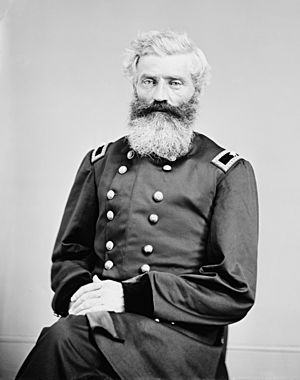Henry Baxter facts for kids
Quick facts for kids
Henry Baxter
|
|
|---|---|

Brigadier General Henry Baxter
|
|
| Born | September 8, 1821 Sidney Plains, New York |
| Died | December 30, 1873 (aged 52) Jonesville, Michigan |
| Place of burial |
Jonesville Cemetery, Jonesville, Michigan
|
| Allegiance | United States of America Union |
| Service/ |
United States Army Union Army |
| Years of service | 1861–1865 |
| Rank | |
| Commands held | 7th Michigan Infantry Regiment |
| Battles/wars | American Civil War |
| Other work | Storekeeper, miller, U.S. Minister to Honduras |
Henry Baxter (born September 8, 1821 – died December 30, 1873) was an important general in the Union Army. He fought during the American Civil War.
At the Battle of Gettysburg, his soldiers stopped a strong attack. This attack came from parts of the Confederate army. Baxter's men surprised the enemy, causing many losses. They held their position for most of the day.
Baxter was wounded four times during the war. After the war, he served as a diplomat. He was U.S. Minister to Honduras under President Grant.
Contents
Early Life and Work
Henry Baxter was born in a place called Sidney Plains, Delaware County, New York. His grandfathers had both fought in the American Revolutionary War.
In 1831, when Henry was ten, he moved with his father. They moved to Jonesville, Michigan. Later, in 1849, he went to California with a group of thirty men. They were looking for gold.
He returned to Jonesville in 1852. There, he became a miller, which means he operated a mill. He also led a local military group. This group was known as the Jonesville Light Guards.
Civil War Service
Joining the Fight
Because of his military experience, Baxter was chosen to lead a local company. This company became part of the 7th Michigan Infantry Regiment.
He was badly wounded in his stomach during the Seven Days Battles. Later, at the Battle of Antietam, he was a lieutenant colonel. He was wounded again, this time in his right leg. His regiment suffered many losses in an ambush.
Baxter went back to Michigan to get better. He was then promoted to lead his regiment. This happened before the Battle of Fredericksburg. His regiment was picked for a special mission. They had to cross a river to remove Confederate sharpshooters from the town. They succeeded, but Baxter was wounded a third time. This time, it was in his left shoulder.
When he returned to duty, he was promoted again. He became a brigadier general on March 12, 1863.
Heroism at Gettysburg
At the Battle of Gettysburg, General Baxter's brigade arrived around noon. Confederate soldiers were appearing on Oak Hill. Baxter's brigade moved forward. They set up in a V-shape along the Mummasburg Road.
The Confederates attacked in small groups. Many of their soldiers were cut down. Soon after, another Confederate group advanced. Baxter's men were hidden behind a stone wall. They suddenly stood up and fired.
This surprise attack caused huge losses for the Confederates. In less than ten minutes, Baxter's brigade killed, wounded, or captured 758 enemy soldiers. This made the Confederate brigade unable to fight effectively.
Baxter's men started running low on ammunition. They pulled back to the north end of Cemetery Ridge. They had lost many of their own men. Baxter received high praise for his actions. His commander said he was brave and encouraged his men.
Later Battles (1864–1865)
Baxter kept command of his brigade in March 1864. This showed that his leaders trusted him. His brigade was assigned to the 2nd Division, V Corps.
At the Battle of the Wilderness, he was shot in his left leg. The bullet also killed his horse. After he recovered, he led another brigade. This was during the later parts of the siege of Richmond and Petersburg.
He left the volunteer army on August 24, 1865. In 1866, he was given an honorary promotion. He became a brevet major general.
After the War
After the war, Baxter worked as a Register of Deeds in Michigan. Then, in 1869, President Grant appointed him. Baxter became the U.S. Minister to Honduras. This means he was America's representative in Honduras.
He came back home in 1872. He then worked in the lumber business. Henry Baxter died from pneumonia in 1873. He passed away in Jonesville, Michigan. He is buried in the Jonesville Cemetery.
A book about his life was published in 2016. It is called "General Henry Baxter, 7th Michigan Volunteer Infantry: A Biography."
See also
- List of American Civil War generals (Union)

